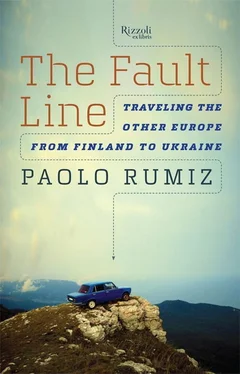“Once there was nothing here. Then Peter the Great came and built the factories. Then there were the wooden houses. Now the time has come for houses made of cement, and I’ll have to go there, too. Very soon they’ll come here with a bulldozer, and they’ll tear it all down. It’s a real shame. I’ve been living here since 1947, and I know everybody. But come in, my friends.”
We enter a small, comfortable, and orderly apartment. On the kitchen sideboard, there’s a picture of a man. I ask her if that’s her husband.
“No, that’s my son. He died in February. He was forty. Now I live for my grandson. I cook only for him. His mother isn’t up to it. But come, sit down. I’ll make you some Russian blini. I was just stirring the batter. All I have to do is fry them.”
She moves frenetically, lights the fire, and if she could, she’d roll out a red carpet. In an instant, the table is set with a white tablecloth next to an abat-jour .
Monika takes Alya’s picture as she raises her eyes heavenward, her left hand holding the frying pan and the right evoking days gone by.
I tell her she has marvelous eyes.
“If you knew how they were once! Big… and deep. Oh hell, the blini aren’t the right shape. See? I’ve got guests and instead of doing things right, I start yapping.”
She dances, bringing to the table a delicacy that is called varenye , a marmalade of forest berries and honey. It is used to sweeten the tea, which here is not sugared. Then brown bread and homemade butter. Russian hospitality is all right here in this food and this warmth.
“I always have something ready, you know, for whomever might come. But fewer and fewer people are coming, and then I have to give stuff away. But you eat, eat some more; men have to eat more than women.”
She serves up seven blini on my plate and bids me eat ot dushi , “from the soul.” Then she tells us about her microeconomy of barter in which nothing is thrown out.
“My neighbors bring me more fruit than I can eat, so I make jams and marmalade, which then become gifts.”
We sing the praises of the flowers that she has planted in the common garden.
“Ah, once they were much more beautiful. These days the young people drink too much and break everything. The flower bed is all broken, and if I yell at them, they insult me. It’s incredible. They live like wolves. They’ve got no sense of limits. And they don’t know the difference between good and bad. My heart aches for them.”
I say that maybe wolves are better; at least they have a sense of the pack, and they don’t throw away food.
Meanwhile the neighbor, Sofia Pavlovna, comes in without knocking to join us, carrying some chocolates.
“See. Sofia and I understand each other. We know the value of every kopek. We give ourselves to others. But young people today know only how to take. Between us and them, there’s a basaya raznitsa , an enormous difference. Maybe our grandchildren will be different, but I’m not too sure. Tell me: how did all of this happen?”
I tell her that it’s a disaster in the West, too. But it doesn’t matter to me. I’m happy to be here with her. We tell her that it’s lovely to be there at her table. “I’m happy, too. When a foreigner passes by, I can’t resist. I ask him where he’s going, where he’s from, where he’s staying.”
The samovar is steaming, and it’s getting dark out.
“In 1941, during the German attack, there was nothing left to eat. My mother and brother died of hunger and cold. I managed to escape. They put me together with some other orphans in Saint Petersburg, put us on a boat on the Onega and sent us up the Volga until the war was over. My father was at the front. He made it all the way to Berlin with General Zhukov. Then I came to live here, and for forty years, I worked in a nursery school. It was an extraordinary collective; we all gave our souls to it. They were hard times but beautiful times. Even today we are still united. Every so often, we get together, and the comrades say to me, ‘Come on, Alya. Bring some cucumbers and your blini, and if you have time, bring a few pirogi, too.’
“I love children. And you know what? I have a recurring dream: children in trouble, and I can’t do anything for them. So I wake up with a start, and in that exact moment, I realize that life is passing me by. Ah, time goes so quickly. Each day just like the others. I get up and take my time getting washed and dressed, do something, and it’s already two o’clock. In the afternoon, I talk with my friends, and the day is done.”
We’ve got to get on our way so we won’t miss our train. Another painful good-bye. Ciao, Alya. You’ll always be in our hearts. Your story explained Russia to us better than a stack of books. And a half hour later, as we’re leaving Petrozavodsk, on a platform crowded with young people on their way to North Karelia with inflatable canoes, hockey sticks, paddles, bicycles, and complete sets of camping equipment, we already feel the void left by her absence. “Are you going to Peter?” the kids ask us. For them, Saint Petersburg has already become a person, an uncle or a brother. “I love Peter,” says an architecture student who is doing an internship in a firm. “I’m crazy about Peter,” echoes a young sunburned blond who’s trying to put her mud-speckled bicycle on the train after pedaling through the wilderness lands on the way to Arkhangelsk.
We’ll be in Peter in a night, but now we’re still looking for the frontier, the train for Suoyarvi. We want to attempt the circumnavigation of the biggest lake in Europe, Lake Ladoga, nearly all the way to Finland, and then go down to Saint Petersburg from there. A killer itinerary with no reasonable connections—purposely to impede you from exploring the militarized border with Finland—with endless layovers in Suoyarvi, Sortavala, Khiytola, and Vyborg. A soft departure, with platforms full of people saying good-bye. Attractive young people, better than the metropolitan tourists who trash Alya’s garden. The conductor is pretty, with sweet Baltic eyes, and she’s more elegant than a flight attendant. The samovar next to her bunk is already lit.
Ah, Russian trains. We’re entering a world of endless forests. Monika falls asleep instantly. She’s got a capacity for sleep that I have envied since the start of this journey. A militant sleep, the deep sleep of those who work. I, on the other hand, need to perform long rituals. I fold down the sheet, straighten the blue blanket, set down on the table the little illustrated book of the epic of Kalevala , close the pleated curtain, stick my stuff into the chest whose cover is my bunk.
Another hour goes by before I am in my dream together with the boat Väinämöinen , Alya’s blini, and Anatoly Fyodorovich’s accordion, as the train heads toward Finland under a green sky, searching for the impossible night of the North.

6. BALTIC
FAREWELL, WILD KARELIA, lacustrine archipelagos and labyrinthine rivers.
When I see from the train window the immense walls of Vyborg, the Finnish port taken by the Russians in 1944, I’m struck with a strange anxiety. I’m changing orbit. With a malevolent magnetism, the great centers and flows of the EU periphery are tearing me away from the terra incognita, where I have been joyously hiding out for the last two weeks, and pulling me toward known places.
After Khiytola, my map of the North—a highly detailed one-to-a-million scale that I bought in Norway—has become useless to me. Now I belong to the greater Europe, “my Europe.” I’ve now entered the one-to-five-hundred thousand map that I usually consult, the one that still has, on the upper right, old Leningrad.
Читать дальше













